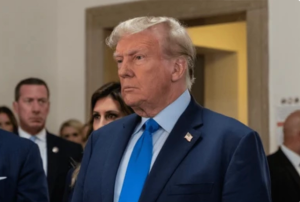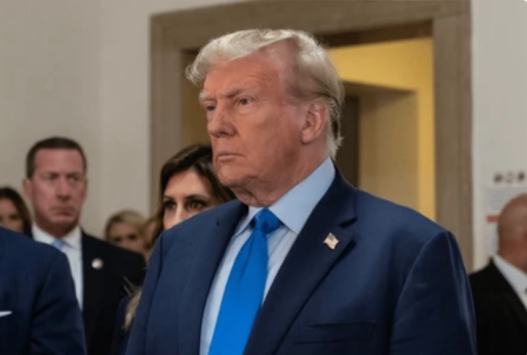
THE MEDIA'S PROFOUND DILEMMA IN THE FACE OF THE TRUMP PHENOMENON AND A DEBATE THAT REACHES AS FAR AS ARGENTINA
By Gail Scriven / La Nación, Argentina
Has the American press succumbed to the “banality of madness”? Is it feigning insanity with Donald Trump, helping to “normalize” a dangerous autocrat?
The November 5 election will be the most crucial election in U.S. history. After the profound debate that erupted over the role of the press – with its alleged mistakes – during Trump’s rise from 2016, and the subsequent open warfare against what he dubbed “the enemy of the people,” the country faces a new crossroads. And, like everything that happens in the U.S., it has clear global implications: do the rules of journalism change when democracy is at stake? Is it the beginning of the end of objective journalism and are the old values of balanced coverage in question? Even more relevant: who defines when democracy is at stake?
Trump makes no secret of what it is. There is no mystery. “I will be a dictator from day one,” said the man facing 91 charges in court. He suggested that Mark Milley, former chairman of the Joint Chiefs of Staff, should be executed for treason. He claimed that in his government, thieves would be killed before they walked out the door, Duterte-style in the Philippines. He repeated Hitler’s anti-immigration rhetoric. He admitted that he will use Justice as a personal weapon of revenge. He said he would encourage Russia to attack any NATO ally that is not up to date with its payments. He opined that immigrants are “animals”.
This is just a small sample. His explosive rhetoric has been escalating, week after week. How much of this made the front page of newspapers or the highlights of American sites? Little and none.
In a hard-hitting essay published late last year, Brian Klaas, professor of political science at University College London, asserted that the American press has fallen into the “banality of madness.” The term, a nod to Hannah Arendt, has spread like a rallying cry against some media, even the most prestigious, such as The New York Times.
“The arguments for amplifying Trump’s madness” is the title of the essay, in which Klaas, who studies political violence around the world in depth, argues that the American press is not up to the moment. “These are dangerous times. Trump’s scandals have become predictably banal. The press, which in 2017 reported on his every tweet, now ignores even the most dangerous proposals of an authoritarian who is about to become the most powerful man in the world again,” he warns. “The biggest danger is that there is an asymmetry between how the press treats Joe Biden, by the old rules, and how it treats Trump, simply because he is so flamboyant,” Klaas says.
Marty Baron, arguably one of the people who knows most about the challenges of dealing with a leader like Trump after running The Washington Post for eight years, agrees that what’s coming is dangerous. “There is no doubt that Trump represents a threat to democracy. He talks openly about implementing policies that are authoritarian in nature. I think we can expect him to do exactly what he says, or worse,” Baron, author of the book Collision of Power, tells LA NACIÓN. “Trump’s plans, in fact, are what we have seen in other parts of the world from aspiring authoritarians.”
Baron does not share the criticism of the traditional media for coverage of these authoritarian Trump impulses. “I think there has been extensive coverage. The problem, though, is that Americans don’t seem to care as much about democracy as they once did.”
Jeff Jarvis, professor of journalism and author of the book The Gutenberg Parenthesis, also has an alarming prognosis: “American democracy is vulnerable. Trump has crossed every red line, and the line keeps moving,” he tells LA NACIÓN. Jarvis believes that American politics has undergone a profound transformation: “There are no longer two sides in politics. There are established institutions and there are extremists. Tragically, the media learned nothing since 2016. They refuse to understand the asymmetry of American politics.”
Amplify the message or not. To ignore it or to give it a megaphone to spread its most bizarre lies, even at the risk of what Time magazine baptized as “outrage fatigue”, the weariness with scandals. That is the great crossroads facing the media in the United States, a country that often serves as a mirror that advances for other nations and for other leaders who imitate or reference Trump.
“It’s not an easy problem to solve,” argues Jay Rosen, a media critic and journalism professor at New York University. “There’s no point in amplifying Trump’s follies, like when he was talking about magic cures for Covid. But I increasingly agree with Brian Klaas that Americans need to know how extreme Trump is becoming. The political class must understand the threat.”
Rosen is lapidary about the role of the press. “It failed in two phases: at first we amplified it. Now it’s the opposite,” says Rosen, for whom the key is to reflect “not the chances of one candidate or the other, but what’s really at stake.” That is the mantra that should guide the media at this crossroads, he says. “There is no doubt that democracy is at risk if he wins. And there is no doubt that it is at risk if it narrowly loses.”
“It’s easier to understand the threat Trump poses to democracy when you see it with your own eyes,” argues Susan Glasser from The New Yorker magazine. “Small doses of lunacy can be dismissed as background noise.”
To put it in more colloquial words, it would be like downplaying his promises, claiming, “That’s just the way Trump is.” A dangerous normalization.
The major U.S. newspapers are immersed in this profound dilemma, which is virtually unprecedented. And against the backdrop of what Trump meant in terms of audiences for the industry, the so-called “Trump bump”, the boom experienced from the New York Times to The Washington Post during the campaign and his presidency. As a sample button of what for many is the “codependence” between the media and Trump: CNN lost 45% of its audience in the month after his departure from power.
Joseph Kahn, executive editor of The New York Times, warned in an interview with the site Semaphore that the newspaper is a “pillar” of democracy, but not a tool of power. “To say that the threats to democracy are so great that the media should abandon its role as a source of unbiased information is essentially saying that it should become a propaganda arm for one candidate or another,” he warned, stressing that it is key to find balance and, fundamentally, context, without falling into censorship.
Baron agrees: “We can’t become partisan. That would be a gift to our harshest critics, it would give them ammunition to undermine our credibility.”
In opposition, The Atlantic magazine was explicit: it ran an entire issue late last year on the challenges for the press, with the question, “Did the media learn its lesson?” As Charles Sykes wrote in a column in that medium, the answer should be, “Only if they understood that the rules have changed.” The Guardian, in the same vein, headlined just a few weeks ago, “Trump’s bizarre and vindictive incoherence has to be heard in its entirety to be believed.”
Gabriel Debenedetti, who covers political issues for New York Magazine, thinks the key is to place Trump’s actions and sayings in a historical context. “When he lies, we must clearly state that it is a lie. The responsibility of the press is the truth, not simply repeating a candidate’s sayings without question,” he told LA NACIÓN.
“People must know what they support. Alarm bells should be ringing every day,” warns Jay Rosen.
It is a debate, undoubtedly, to watch with special attention from Argentina, at a time when the political pressure against journalism is increasing all over the world. As during Kirchnerism, political polarization, insistent attacks on the media and journalists are sounding alarm bells in the country, which in the last annual report of Reporters without Borders fell 26 places in the ranking that evaluates press freedom. And, as the Poynter Institute warns, when you close the door to the press, you close the door to the citizens.
————
This article was originally published in the newspaper La Nación, Argentina, with whose authorization we reproduce it here.



